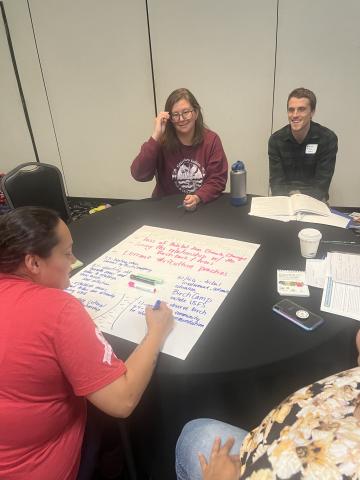1st Quarter Accomplishments of the Northern Forests Climate Hub
Highlights from our work in the first quarter of fiscal year 2023 (October-December).
Advancing Tribal Climate Adaptation Priorities Through the Tribal Forest Protection Act
Elevating tribal values through climate change adaptation is one vital way to ensure that federal agencies are honoring our obligations to tribal nations. The USDA Northern Forests Climate Hub, Northern Institute of Applied Climate Science, and tribal partners collaborated to encourage the use of the Tribal Forest Protection Act (TFPA) to advance tribal climate adaptation priorities. In a December 2022 workshop, two Michigan tribes and their associated National Forest identified mutual climate adaptation priorities and developed projects that tribes can initiate through the TFPA. Participants considered projects related to promoting the regeneration of culturally important trees and understory medicinal plants, the indigenous use of prescribed fire, and more. This workshop was attended by 65 people from the Keweenaw Bay Indian Community, Lac Vieux Desert Band of Lake Superior Chippewa, and the Ottawa National Forest.


Integrating Climate Change into Watershed Planning
Climate change is presenting new vulnerabilities to forested watersheds around the country. The USDA Forest Service is building resilience into landscape-level planning by incorporating climate change considerations into the Watershed Condition Framework (WCF). The FS Eastern Region and FS Office of Sustainability and Climate collaborated with the USDA Northern Forests Climate Hub to host a two-part virtual workshop for regional National Forest watershed specialists to facilitate a process of integrating climate change into Watershed Restoration Action Plans (WRAPs) using readily available data, resources, and tools. The workshop provided technical assistance to USFS Region 9 watershed specialists and introduced a framework for planning in priority watersheds that can assist in the documentation of climate considerations.
Workshop Series: Tree Species Vulnerability Assessments Supports Boston’s Urban Forest Adaptation
Urban forests are critical sources of shade, natural beauty, and air quality for cities across the country, but climate change is presenting a new array of challenges to keeping urban forests healthy and thriving. A workshop series provided direct training on climate change vulnerability and adaptation considerations for urban and community forestry professionals in the greater Boston region. American Forests engaged the USDA Northern Forests Climate Hub and Northern Institute of Applied Climate Science (NIACS) to host workshops to support adaptation planning for Boston’s urban forest.
Participants used two resources developed by American Forests, the USDA Forest Service, NIACS, and regional partners, the Boston Region: Tree Species Vulnerability Assessment publication and the Climate and Health Adaptation Menu. Workshop participants received coaching and feedback on their own real-world urban climate adaptation projects.


Practical Ideas to Help Loggers Adapt to Climate Change
Loggers are on the front lines of climate change in many respects, as they are coping with changes such as milder winters and also as they implement the forest management practices designed to keep forests healthy and diverse. To provide useful information to this critical audience, the USDA Northern Forests Climate Hub and Northern Institute of Applied Climate Science organized a 4-hour training session on climate change trends, climate impacts, and adaptation for Michigan loggers. The course, ‘Adapting to Climate Change: Practical Ideas for You and Your Business’ was offered as professional education for loggers who need to maintain accredited status through the Michigan Sustainable Forestry Initiative certification.
Questions? Contact the USDA Northern Forests Climate Hub staff

